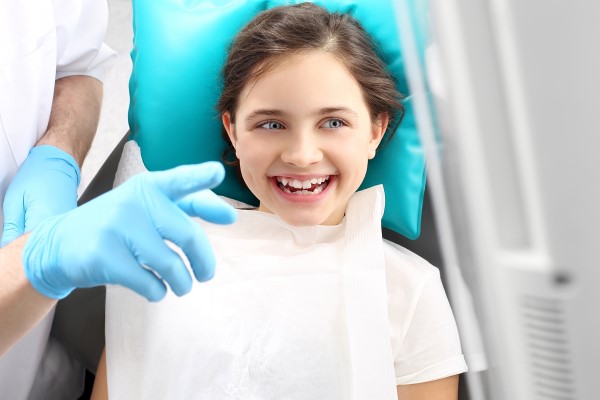What Can Cause Malocclusion?

A malocclusion is an uneven position of the teeth when the jaw is closed. It can cause cosmetic and oral health concerns when left untreated. By having a full understanding of exactly what malocclusion is and what causes it, you can make a determination as to whether treatment is right for you.
Common causes of malocclusion
A malocclusion can be the result of a variety of causes. It is important to be able to determine the cause to know what the best form of treatment is. The following are four of the more common causes of malocclusion, although one can result from a variety of other factors as well.
It is also important to note that there are different levels of malocclusion, ranging from class one to class three. A minor case may not require any treatment unless the person requests it. But, more serious bite complications can make it difficult to function or maintain good oral hygiene and may require treatment.
Hereditary condition
A malocclusion is most often a hereditary condition. This means there is a family history of malocclusions that increased the risk. In many instances, a person simply has an uneven upper and lower level jaw. This results in an overbite, underbite, or another form of malocclusion. Thus, the cause of this misalignment is likely genetic.
Childhood care
The way teeth are treated at a young age can also play a role in whether a malocclusion exists. In particular, childhood habits such as thumb-sucking can be detrimental to the alignment of teeth if the habits continue past the age of three. Consequently, it is important for parents to try and discourage thumb-sucking after their child reaches the age of three or four. Although thumb-sucking before the age of three is natural and generally not a cause for concern.
Additionally, teaching good oral care habits at a young age and ensuring the child keeps their teeth clean can help minimize the chance of malocclusion as they grow older.
Jaw misalignment
In a large number of instances, malocclusions are not the result of crooked teeth but are instead due to jaw misalignment. Many of these cases are hereditary and there is no life event that caused the misalignment. But, there are times when an injury can lead to a malocclusion. This is especially true if treatment was not administered following the injury to ensure the jaw heals properly. When this occurs, corrective jaw surgery may be a better option than teeth straightening, particularly if the teeth are not crooked.
Extra teeth
In some cases, there is no need to look further than the teeth when trying to find the cause of malocclusion. If there are extra teeth in the mouth, which is a condition known as hyperdontia, then there is an increased risk of tooth malocclusion. Other teeth complications, such as impacted teeth, lost teeth, or abnormally shaped teeth, may result in a malocclusion as well.
How does a dentist treat malocclusions?
Malocclusions can be treated through orthodontic treatments such as braces and clear aligners. The extraction of one or more teeth may be necessary as a part of an orthodontic treatment plan. In more severe cases where orthodontic care cannot adequately address the malocclusion, corrective jaw surgery (orthognathic surgery) may be the most suitable option.
Braces or clear aligners
Braces and clear aligners are the most popular forms of treatment for dental malocclusions. Both treatments involve straightening the misaligned tooth (or multiple misaligned teeth) by moving them until the ideal alignment is achieved. Braces achieve this through the use of metal (or ceramic) brackets and wires that are placed on each tooth, and clear aligners involve wearing aligner trays that gradually shift teeth into the optimal position.
Tooth extraction (if necessary)
Tooth extraction is sometimes necessary during orthodontic treatment, particularly when there are issues of overcrowding or the jaw is not large enough to allow for the shifting of misaligned teeth.
Orthognathic surgery
Corrective jaw surgery is more specifically used to address jaw malocclusions rather than misaligned teeth. However, jaw malocclusions can lead to misaligned teeth and the two may be interconnected. A corrective jaw surgery procedure is usually only recommended when it is the only viable treatment option.
Ready to schedule your appointment?
If you think you are suffering from malocclusion, then contact our dental office today. We can help you identify the problem, determine the cause, and suggest a treatment plan for you.
Request an appointment here: https://nettsmiles.com or call Nett Pediatric Dentistry & Orthodontics at (623) 759-7658 for an appointment in our Phoenix office.
Check out what others are saying about our services on Yelp: Read our Yelp reviews.
Recent Posts
In pediatric dentistry, dentists assess how certain food types affect oral health and make recommendations accordingly. Common childhood snacks can harm teeth by breaking down enamel and contributing to periodontal diseases, such as sugar-filled yogurt packs, cookies, and citrus fruits.This review takes a closer look at snacks parents can provide for their children that are…
Once teething starts, you should pay close attention to your child's teeth to avoid tooth decay, cavities, and other oral health problems. A dentist specializing in pediatric dentistry might advise against pacifiers and other items that might interfere with the healthy development of their oral tissues. Sucking on a pacifier is common among infants and…
Pediatric dentistry is a vital part of a child's healthcare team. They are responsible for the oral health of babies, children, and adolescents. A pediatric dentist has the education and experience to care for a child's unique dental needs. In addition, they can provide preventive care, diagnosis, and treatment of various dental problems.Parents need to…
Pediatric dentistry works with parents and children to keep gums and teeth healthy. Brushing daily may be an important part of oral care, but it is not enough. Flossing must be a habit in kids as well. If you want to know more about the importance of daily flossing, here are the details straight from…


